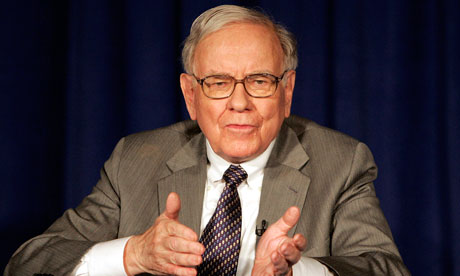Results 31 to 40 of 59
-
08-21-2011 #31Rookie Poster

- Join Date
- Sep 2006
- Posts
- 50
 Re: Buffett: Tax Me and My Mega-Rich Friends
Re: Buffett: Tax Me and My Mega-Rich Friends
"There are over 36000 people in the U.S. worth more than $30 000 000.00. If we taxed each 3.33% we'd get a million dollars from each for a total of 36 trillion dollars; i.e. $36 000 000 000.00. That would make a dent in the deficit."
The math doesn't work. It looks like 36 billion not trillion. Its a shame because that would have seemed rather easy ( of course it wasn't my 1 million being taken away either) to reduce the deficit. Now based on the math, if you took 30 million from the 36 thousand people you get a little more than 1 trillion dollars which now makes me rather sick that reducing the deficit will truly take a massive effort by all Americans.
-
08-21-2011 #32Hung Angel Platinum Poster


- Join Date
- Mar 2006
- Location
- The United Fuckin' States of America
- Posts
- 13,898
 Re: Buffett: Tax Me and My Mega-Rich Friends
Re: Buffett: Tax Me and My Mega-Rich Friends
Yes, your right. If 36000 multimillionaires worth more than 30 million each contributed 1 million it would total 36000 million, which is 36 billion. But the tax rate is a paltry 3.3%. If the tax rate were 33.3% the revenue on on that tax bracket alone would be 360 billion, which is well over 1/3 of a trillion dollars. That already is a considerable dent in the deficit. And again they wouldn't miss it. Each would still be left with 29 million dollars and trying to figure out what luxuries to spend it on, or just how many hummers do they want in their fleet. This computation completely ignore the brackets between a quarter of a million and 30 million which are much larger brackets. What for example if we tax those worth 15 million or more 33.3%; how much more than 360 billion would that revenue be?
The first thing we need to do is get the economy back on track. Then we can worry about cutting programs to reduce the deficit. You don't cut programs when people need them the most. You don't lay people (which is exactly what cutting government programs means) off when the economy is floundering for lack of demand. We need to do the opposite. The private sector has restructured. It's not creating jobs and it's not about to create jobs regardless of how many tax breaks you give to corporations. They like making do with a highly productive minimal work force. It's up to the government to make jobs. No one else will do it. Labor is cheap. Interest rates are low. This is the time to create jobs through government projects and programs. Once we have a healthy demand the economy will come roaring back. When people are back to work, then we talk about cutting holes in their safety nets.
Last edited by trish; 08-21-2011 at 07:38 AM.
"...I no longer believe that people's secrets are defined and communicable, or their feelings full-blown and easy to recognize."_Alice Munro, Chaddeleys and Flemings.
"...the order in creation which you see is that which you have put there, like a string in a maze, so that you shall not lose your way". _Judge Holden, Cormac McCarthy's, BLOOD MERIDIAN.
-
08-24-2011 #33
-
08-26-2011 #34
 Re: Buffett: Tax Me and My Mega-Rich Friends
Re: Buffett: Tax Me and My Mega-Rich Friends
Linda McQuaig. She's a very good writer. And, well, she's 60 years of age. She looks absolutely stunning. I'm in awe at how good she looks for 60. Is 60 the new 40 -- ha ha ha!
-
08-26-2011 #35
-
08-26-2011 #36
 Re: Buffett: Tax Me and My Mega-Rich Friends
Re: Buffett: Tax Me and My Mega-Rich Friends
Oh nice I see Jimmy Buffett is hosting a fundraiser for Obuma. Glad to see he is an independent source.
-
08-27-2011 #37
-
08-27-2011 #38
 Re: Buffett: Tax Me and My Mega-Rich Friends
Re: Buffett: Tax Me and My Mega-Rich Friends
Where is Britain's Warren Buffett or Liliane Bettencourt?
Instead of calls to pay more tax, Britain's tycoons are looking for ways the rich can make money out of the poor
-

- Polly Toynbee
- guardian.co.uk, Friday 26 August 2011 21.00 BST
 Billionaire Warren Buffett has called on the rich to pay their share of tax and rejoin society. Photograph: Seth Wenig/AP
Billionaire Warren Buffett has called on the rich to pay their share of tax and rejoin society. Photograph: Seth Wenig/AP
Let us now praise (some) rich men and women, the rare few who understand that philanthropy is no substitute for tax. First honours go to Warren Buffett calling on the rich to pay their fair share of tax and rejoin society. "My friends and I have been coddled long enough by a billionaire-friendly Congress. It's time for our government to get serious about shared sacrifice," he wrote in the New York Times, indignant at being taxed half what his office employees pay.
Let's praise those 16 French billionaires who asked to be taxed more. "At a time when the government is asking everyone to show solidarity, we feel we must contribute," said L'Orιal heiress Liliane Bettencourt, along with a list of others. French president Nicolas Sarkozy, hardly a man of the left, this week did raise an emergency 3% levy on the rich.
How different things are here, where the chancellor hints at cutting top tax and has just struck a tax-dodgers' deal with Swiss banks. The cock-a-hoop press release from the Swiss Bankers Association tells how little has changed: Brits who have hidden away ill-gotten or untaxed funds will stay anonymous, hidden from UK tax authorities. Most will pay a paltry 20-25% for what the bankers call "regularising the past". For "regularising" read escaping punishment for previous theft from the Treasury. Christian Aid calls it a disgrace and Richard Murphy, tax campaigner, warns that Britain's top-rate tax payers can now quite legally bank in Zurich to pay less tax. The Treasury will recoup £5bn but Murphy says that should have been £25bn.
In Britain this week, instead of calls to pay more tax, Sir Ronald Cohen, private equity tycoon, helped launch a plan for the wealthy to invest in projects to improve the poor not as philanthropy but for a return of between 2.5% and 13%: the government will pay out rewards for future costs saved by social interventions. (Sir Ronald is the man credited with persuading Gordon Brown to cut capital gains tax from 40%, to a disastrous 10%, setting off a private equity and property boom, as the rich rebranded their income as capital gains.) For years Cohen, with charitable intent, has developed Social impact bond - Wikipedia, the free encyclopedia@@AMEPARAM@@/wiki/File:Social_Impact_Bond_diagram.JPG" class="image"><img alt="Social Impact Bond diagram.JPG" src="http://upload.wikimedia.org/wikipedia/en/thumb/a/ae/Social_Impact_Bond_diagram.JPG/220px-Social_Impact_Bond_diagram.JPG"@@AMEPARAM@@en/thumb/a/ae/Social_Impact_Bond_diagram.JPG/220px-Social_Impact_Bond_diagram.JPG, launched , as a way to monetise social problems and raise private revenue to solve them. Four Tory councils will start offering bonds but so far all crucial details are missing. It's a novel solution to extreme inequality, inviting the rich to make money out of the poor.
The first pilot began a year ago: bonds were sold to cover a charity's promise to reduce reoffending by 3,000 prisoners released from Peterborough prison. A Ministry of Justice independent evaluation notes the problems. First and worst, the contractual relationships are highly complicated. Second, funding so far is mostly not private investment but from charitable foundations money anyway destined for good works. Gaining the confidence of all participants state, investor and the charity providing the programme was "time-consuming" and "raises questions about the role and quality of evidence demanded by intermediaries and investors". Future schemes should "take account of the time and skills needed to develop outcome measures".
Assessing statistical significance of results was crucial and yet the right data was difficult to get even on reoffending. A future risk is the danger of providers "cherry-picking" easy and profitable prospects. Evaluation depended on having a control group of prisoners not in the programme, usually impossible. And which government departments will be billed for the prisoners' improved outcomes if health, justice, social services, benefits and police are all saved future spending?
This small scheme with a simple target prisoners reoffending less raised those dilemmas. Imagine the headache of drawing up watertight contracts that take a "problem family", evaluate their addictions, mental health, education, crime, truancy or unemployment, then put a price on their heads, returning to measure the cash value of any improvements a few years later. Add in top-sliced money wasted on financiers and accountants with time wasted by civil servants and evaluators. Existing family intervention projects (FIPs) are excellent but take time and money: so will this, while the economy, jobs and wages will ultimately determine success. Here is an extraordinarily cumbersome way of creating a PFI, worse than those recently castigated by the Treasury select committee.
All this springs from a belief that the private sector is always more efficient, whatever its mind-boggling extra costs. After all, the government can always borrow at 1% less than the private sector. Sir Ronald and the government say these are suitable investments for pension funds, ISAs and even junior ISAs where families save for their children. In other words, they are rock-solid safe. That means, as with previous employment schemes and the current work programme, if targets are missed you can bet the state will pay out anyway. So the risk will not be transferred from taxpayer to investor, but the state is borrowing expensive money to pay back later come what may. The public accounts committee will need a beady eye on money wasted on a fancy financial vehicle. If it looks too good to be true, it probably is.
Some charities put their hope in these bonds in this funding drought. Other charities ask why any money their hard work and volunteers save the state isn't recycled to them instead of skimmed off to investors. This has all the hallmarks of prime political gimmickry, an eye-catching distraction from the £1.3bn the coalition has cut from charities and the 20% cut from existing early interventions such as Sure Start.
If only Sir Ronald would instead rally the rich to pay all their taxes; with no avoidance he would raise far more than his bonds ever will. He might galvanise them to support wealth taxes earmarked for social programmes. He could shame the Philip Green and Lewis Hamilton tax avoiders. Here's what David Cameron said about rioters: "The root cause of this mindless selfishness is the same thing I have spoken about for years: it is a complete lack of responsibility in parts of our society. People allowed to feel that the world owes them something, that their rights outweigh their responsibilities and that their actions do not have consequences."
Just so, but Britain lacks a Buffett or a Bettencourt to bring the rich back into the responsible society, to reel in their soaring separation from the rest. Investing in poverty bonds for a 13% return isn't quite the same.
-
-
08-28-2011 #39
 Re: Buffett: Tax Me and My Mega-Rich Friends
Oh boy! Get ready to jump into the RDS (recidivist default swaps) market. This could be fun. It's Britain, where they already have all those on line casinos. Just publish all the details on each parolee so folks can lay down their bets on how long they'll be able to stay on the straight & narrow. Then just bundle them together & sell the packages to retirement annuity funds or the PPIIGS. Hey! What could possibly go wrong? The market will handle it. No need for government involvement. The private sector can do everything so much better... Just ask the Randian egoist cult or the Van Misesites. They wouldn't steer you wrong.The first pilot began a year ago: bonds were sold to cover a charity's promise to reduce reoffending by 3,000 prisoners released from Peterborough prison. A Ministry of Justice independent evaluation notes the problems. First and worst, the contractual relationships are highly complicated. Second, funding so far is mostly not private investment but from charitable foundations money anyway destined for good works. Gaining the confidence of all participants state, investor and the charity providing the programme was "time-consuming" and "raises questions about the role and quality of evidence demanded by intermediaries and investors". Future schemes should "take account of the time and skills needed to develop outcome measures".
Re: Buffett: Tax Me and My Mega-Rich Friends
Oh boy! Get ready to jump into the RDS (recidivist default swaps) market. This could be fun. It's Britain, where they already have all those on line casinos. Just publish all the details on each parolee so folks can lay down their bets on how long they'll be able to stay on the straight & narrow. Then just bundle them together & sell the packages to retirement annuity funds or the PPIIGS. Hey! What could possibly go wrong? The market will handle it. No need for government involvement. The private sector can do everything so much better... Just ask the Randian egoist cult or the Van Misesites. They wouldn't steer you wrong.The first pilot began a year ago: bonds were sold to cover a charity's promise to reduce reoffending by 3,000 prisoners released from Peterborough prison. A Ministry of Justice independent evaluation notes the problems. First and worst, the contractual relationships are highly complicated. Second, funding so far is mostly not private investment but from charitable foundations money anyway destined for good works. Gaining the confidence of all participants state, investor and the charity providing the programme was "time-consuming" and "raises questions about the role and quality of evidence demanded by intermediaries and investors". Future schemes should "take account of the time and skills needed to develop outcome measures".
Assessing statistical significance of results was crucial and yet the right data was difficult to get even on reoffending. A future risk is the danger of providers "cherry-picking" easy and profitable prospects. Evaluation depended on having a control group of prisoners not in the programme, usually impossible. And which government departments will be billed for the prisoners' improved outcomes if health, justice, social services, benefits and police are all saved future spending?
This small scheme with a simple target prisoners reoffending less raised those dilemmas. Imagine the headache of drawing up watertight contracts that take a "problem family", evaluate their addictions, mental health, education, crime, truancy or unemployment, then put a price on their heads, returning to measure the cash value of any improvements a few years later. Add in top-sliced money wasted on financiers and accountants with time wasted by civil servants and evaluators. Existing family intervention projects (FIPs) are excellent but take time and money: so will this, while the economy, jobs and wages will ultimately determine success. Here is an extraordinarily cumbersome way of creating a PFI, worse than those recently castigated by the Treasury select committee.
All this springs from a belief that the private sector is always more efficient, whatever its mind-boggling extra costs. After all, the government can always borrow at 1% less than the private sector. Sir Ronald and the government say these are suitable investments for pension funds, ISAs and even junior ISAs where families save for their children. In other words, they are rock-solid safe. That means, as with previous employment schemes and the current work programme, if targets are missed you can bet the state will pay out anyway. So the risk will not be transferred from taxpayer to investor, but the state is borrowing expensive money to pay back later come what may. The public accounts committee will need a beady eye on money wasted on a fancy financial vehicle. If it looks too good to be true, it probably is.
Some charities put their hope in these bonds in this funding drought. Other charities ask why any money their hard work and volunteers save the state isn't recycled to them instead of skimmed off to investors. This has all the hallmarks of prime political gimmickry, an eye-catching distraction from the £1.3bn the coalition has cut from charities and the 20% cut from existing early interventions such as Sure Start.
If only Sir Ronald would instead rally the rich to pay all their taxes; with no avoidance he would raise far more than his bonds ever will. He might galvanise them to support wealth taxes earmarked for social programmes. He could shame the Philip Green and Lewis Hamilton tax avoiders. Here's what David Cameron said about rioters: "The root cause of this mindless selfishness is the same thing I have spoken about for years: it is a complete lack of responsibility in parts of our society. People allowed to feel that the world owes them something, that their rights outweigh their responsibilities and that their actions do not have consequences."
"You can pick your friends & you can pick your nose, but you can't wipe your friends off on your saddle."
~ Kinky Friedman ~
-
09-01-2011 #40Senior Member Platinum Poster

- Join Date
- Jun 2009
- Posts
- 7,527
 Re: Buffett: Tax Me and My Mega-Rich Friends
Re: Buffett: Tax Me and My Mega-Rich Friends
Similar Threads
-
First they came for the rich...WTF?
By Cuchulain in forum Politics and ReligionReplies: 0Last Post: 12-17-2009, 05:14 PM -
Always listen to Buffett??
By trannybanger in forum General DiscussionReplies: 11Last Post: 10-01-2008, 10:57 PM -
If you were mega rich, would you give away 95% fortune to...
By tsobsession in forum General DiscussionReplies: 18Last Post: 08-14-2007, 06:36 PM -
Escort w/Boy Friends/Girl Friends=Joke?/Myth?/What?
By Nautica in forum General DiscussionReplies: 43Last Post: 06-28-2007, 04:25 PM -
Billionaire Capitalist Warren Buffett supports Clinton/Obama
By Caleigh in forum Politics and ReligionReplies: 7Last Post: 06-03-2007, 02:19 AM



 Reply With Quote
Reply With Quote


